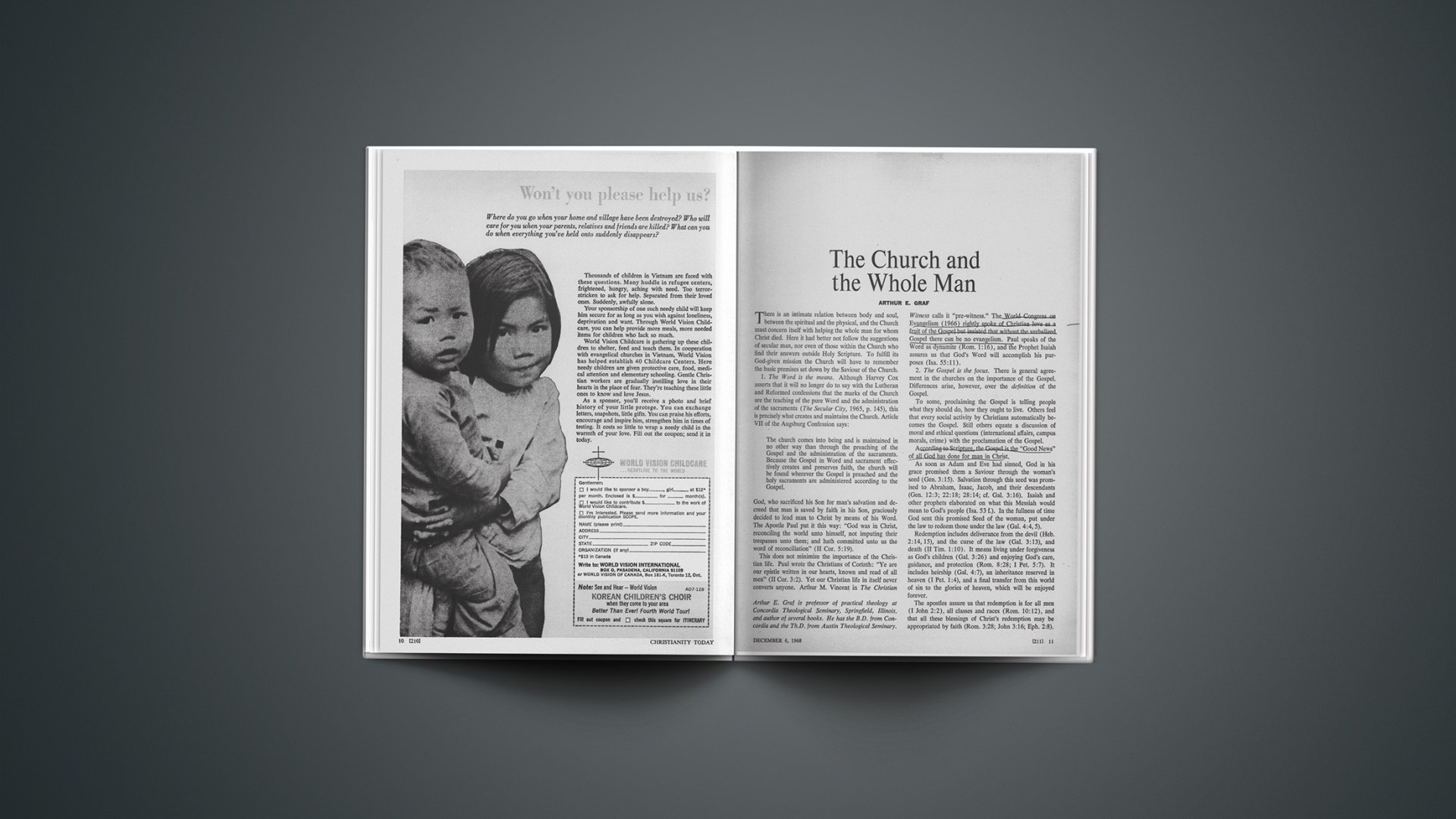There is an intimate relation between body and soul, between the spiritual and the physical, and the Church must concern itself with helping the whole man for whom Christ died. Here it had better not follow the suggestions of secular man, nor even of those within the Church who find their answers outside Holy Scripture. To fulfill its God-given mission the Church will have to remember the basic premises set down by the Saviour of the Church.
1. The Word is the means. Although Harvey Cox asserts that it will no longer do to say with the Lutheran and Reformed confessions that the marks of the Church are the teaching of the pure Word and the administration of the sacraments (The Secular City, 1965, p. 145), this is precisely what creates and maintains the Church. Article VII of the Augsburg Confession says:
The church comes into being and is maintained in no other way than through the preaching of the Gospel and the administration of the sacraments. Because the Gospel in Word and sacrament effectively creates and preserves faith, the church will be found wherever the Gospel is preached and the holy sacraments are administered according to the Gospel.
God, who sacrificed his Son for man’s salvation and decreed that man is saved by faith in his Son, graciously decided to lead man to Christ by means of his Word. The Apostle Paul put it this way: “God was in Christ, reconciling the world unto himself, not imputing their trespasses unto them; and hath committed unto us the word of reconciliation” (2 Cor. 5:19).
This does not minimize the importance of the Christian life. Paul wrote the Christians of Corinth: “Ye are our epistle written in our hearts, known and read of all men” (2 Cor. 3:2). Yet our Christian life in itself never converts anyone. Arthur M. Vincent in The Christian Witness calls it “pre-witness.” The World Congress on Evangelism (1966) rightly spoke of Christian love as a fruit of the Gospel but insisted that without the verbalized Gospel there can be no evangelism. Paul speaks of the Word as dynamite (Rom. 1:16), and the Prophet Isaiah assures us that God’s Word will accomplish his purposes (Isa. 55:11).
2. The Gospel is the focus. There is general agreement in the churches on the importance of the Gospel. Differences arise, however, over the definition of the Gospel.
To some, proclaiming the Gospel is telling people what they should do, how they ought to live. Others feel that every social activity by Christians automatically becomes the Gospel. Still others equate a discussion of moral and ethical questions (international affairs, campus morals, crime) with the proclamation of the Gospel.
According to Scripture, the Gospel is the “Good News” of all God has done for man in Christ.
As soon as Adam and Eve had sinned, God in his grace promised them a Saviour through the woman’s seed (Gen. 3:15). Salvation through this seed was promised to Abraham, Isaac, Jacob, and their descendants (Gen. 12:3; 22:18; 28:14; cf. Gal. 3:16). Isaiah and other prophets elaborated on what this Messiah would mean to God’s people (Isa. 53 f.). In the fullness of time God sent this promised Seed of the woman, put under the law to redeem those under the law (Gal. 4:4, 5).
Redemption includes deliverance from the devil (Heb. 2:14, 15), and the curse of the law (Gal. 3:13), and death (2 Tim. 1:10). It means living under forgiveness as God’s children (Gal. 3:26) and enjoying God’s care, guidance, and protection (Rom. 8:28; 1 Pet. 5:7). It includes heirship (Gal. 4:7), an inheritance reserved in heaven (1 Pet. 1:4), and a final transfer from this world of sin to the glories of heaven, which will be enjoyed forever.
The apostles assure us that redemption is for all men (1 John 2:2), all classes and races (Rom. 10:12), and that all these blessings of Christ’s redemption may be appropriated by faith (Rom. 3:28; John 3:16; Eph. 2:8).
3. The spiritual must have priority. Mrs. Madelyn Murray, well-known for her role in leading the courts to declare against formal prayer in the public schools, remarked: “An atheist believes that a hospital should be built instead of a church.” The Christian believes that both hospitals and churches should be built, but that churches are more important. The spiritual must have priority. But where the spiritual is given true priority, there the material needs of man will be met also.
The conviction that everything in this world is transitory (2 Pet. 3:10) and that heaven is eternal (Rev. 21) underlay the apostles’ great concern for the spiritual. At the same time, their love for the whole man also came to expression in a concern for the poor, the suffering, and outcasts.
4. The clergy have a particular task. Involving the laity in witness evangelism and other church functions is not an option for the Church. The clergy can never begin to do the job alone, nor is this the will of God (1 Pet. 2:9). Christ showed the way by enlisting the seventy, training them, sending them out, and having them report back (Luke 10).
Determined to abide by their assigned task, the apostles insisted, “We will give ourselves continually to prayer, and to the ministry of the Word” (Acts 6:4). The next sentence adds, “And the saying pleased the whole multitude.” The chapter indicates that it also pleased the Lord.
Would it perhaps please God and the people if the clergy of today would carry out this divinely assigned task, trusting God to work through his people for man’s spiritual and physical needs?









